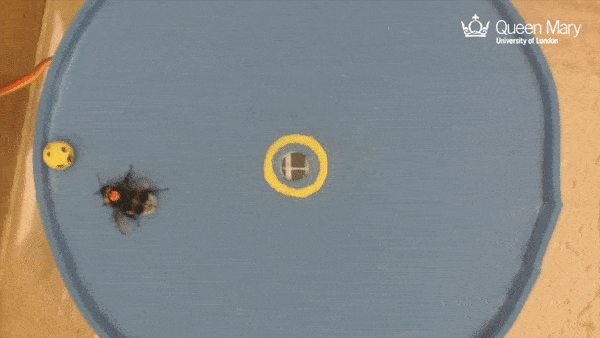What a goal for the team in yellow and black! No, we haven’t all of a sudden turned into a football blog -the “team” in question are bees, who are considerably more clever (and adept at football it seems) than we first believed.
A new study by researchers at the Queen Mary University of London (QMUL) and published in the journal Science, has discovered bees can learn to move a ball to a specific location to receive a reward. The research reveals that individual bees could be much better problem-solvers than we previously thought.
In the study groups of bumblebees were trained to roll a ball from a starting point on a platform to a ‘goal’ at the centre, where they would receive a morsel of food as a reward. The insects were trained in three different groups: one watched a previously trained bee complete the task, another saw the ball being moved by a magnet under the platform, and the other only saw the ball in the centre of the platform with the reward. When multiple balls were on the platform, the bees pushed the closer ball into the goal, even when they only saw a more distant ball being pushed in their training.

“The bees solved the task in a different way than what was demonstrated, suggesting that observer bees did not simply copy what they saw, but improved on it,” says joint lead author Dr Olli J. Loukola. “This shows an impressive amount of cognitive flexibility, especially for an insect.”
So instead of being cogs in the larger machines of their colonies, insects really can use their own initiative to solve problems by themselves.
“Our study puts the final nail in the coffin of the idea that small brains constrain insects to limited behavioural flexibility and only simple learning abilities,” says QMUL’s Professor Lars Chittka.
Bees’ ability to complete such an artificial task could be good news, for anybody shouting they think it’s all over for bees in the wild, who have been in decline since the controversial introduction of neonicotinoid insecticides. “It may be that bumblebees have the cognitive capabilities to solve such complex tasks,” adds Dr Loukola, “but will only do so if environmental pressures are applied to necessitate such behaviours.”
It’s a game that bees can’t afford to lose, but this new research suggests that in times of crisis, bees might just be smart enough to figure out how to score a last minute winner.
Follow Science Focus onTwitter,Facebook, Instagramand Flipboard
